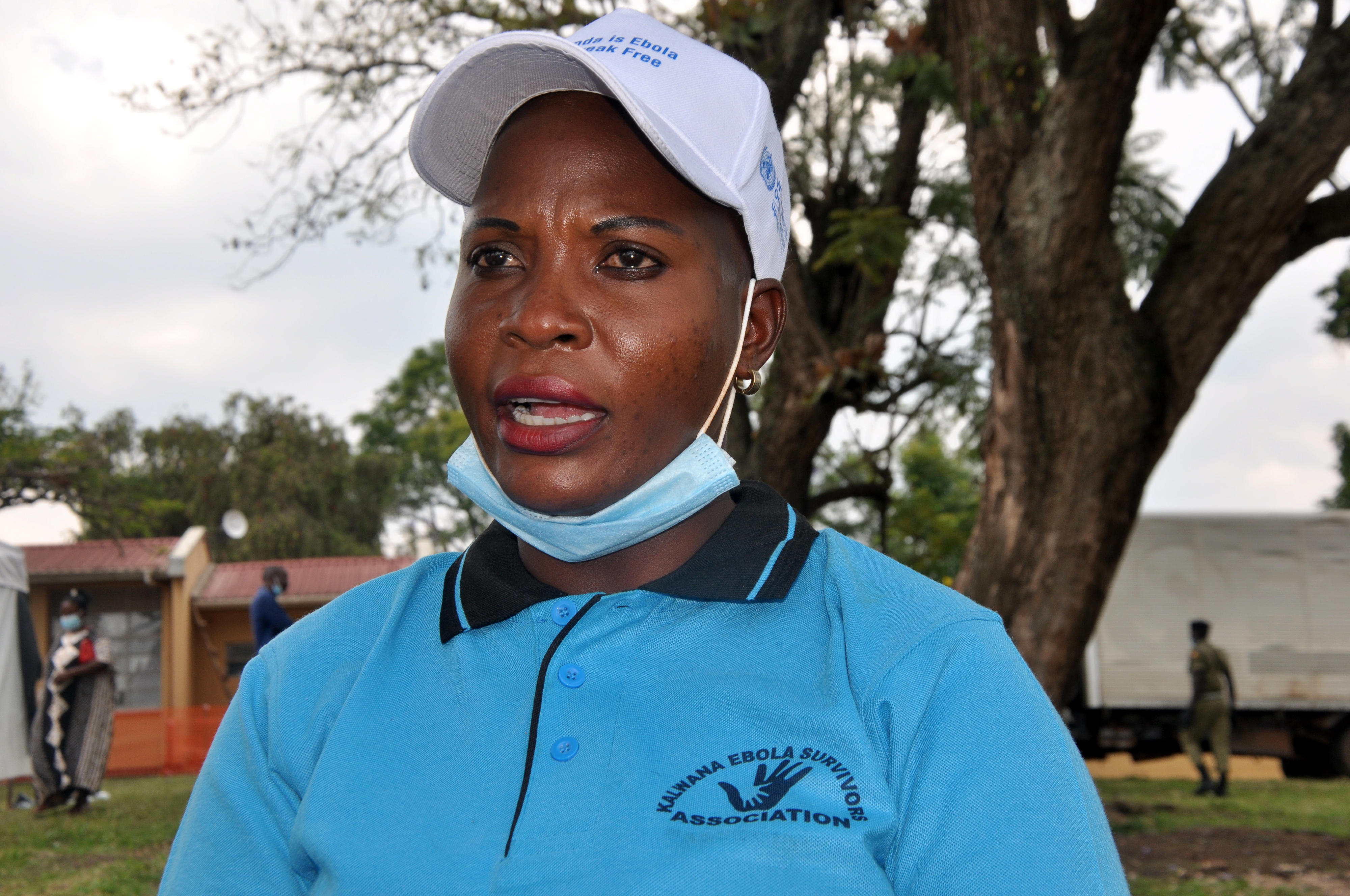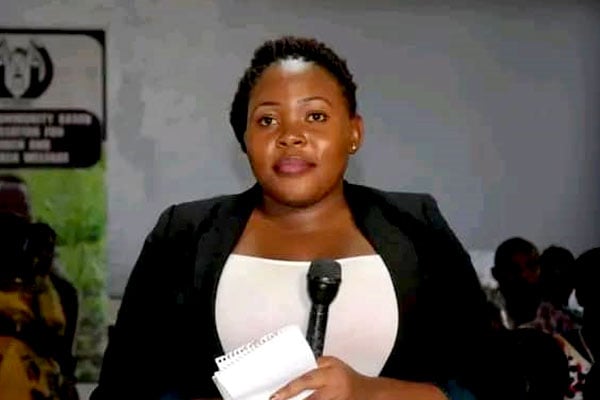Prime
My Ebola story: Namuganyi beat Ebola, struggling with stigma

Resty Namuganyi during an interview with this publication at the weekend. PHOTO | BARBRA NALWEYISO
What you need to know:
- on January 11, the country declared an end to an Ebola virus outbreak that had emerged almost four months earlier and claimed the lives of 55 people. In this first instalment of our new series, Resty Namugenyi, a survivor, shares her story of how she contracted the deadly virus and how she made it out of the hospital alive.
Resty Namuganyi, 30, a survivor of the Ebola virus disease (EVD), is struggling to find a job after her former employer at a wood factory rejected her appeals for reinstatement as a cook.
After her discharge from the Mubende Regional Referral Hospital Ebola treatment unit, and resettlement back home in Kikandwa Village, Kassanda District, Namuganyi says her former employer didn’t have a place for her.
“I used to work at a saw mill owned by a Chinese investor in Kikandwa Village before I fell sick. I have tried to get back my job at the factory but in vain,” she says.
Namuganyi says she is surprised her former manager does not care about her plight yet he knows the struggles she goes through without a job.
“He knows most of the challenges that I go through, including lack of food since I have no source of income but has failed to help me get back my job,” she says.
Namuganyi says even the failure to get back her job is a form of stigma because she thinks her bosses still believes that she is not fit to be in public.
“We urge our bosses to be considerate and allow us to work because we got healed and are very normal,” she says.
She attributes her current status to the stigma that many victims of EVD go through despite the sensitisation from the health teams and community leaders.
“When we got discharged and resettled back at our respective homes, many people continued to believe that we still have the Ebola virus. Some shopkeepers did not want to touch the money that I had and always instructed me to drop the money in a bucket with disinfectant,” she reveals.
Fortunately, after the sensitisation by different health teams, the situation has improved.
“We now get to mix with other people, although a few cases emerge where we are at times stigmatised,” she says.
Namuganyi is a widow after losing her husband, Muzafaru Matovu, to Ebola in October last year.
While a lot of misinformation was given to the health officials regarding the alleged exhumation of Matovu’s body, Namuganyi believes she contracted the disease from her husband.
After the Ministry of health officials buried Matovu, there was a rumour that relatives had exhumed his body to perform some rites on it. Even President Museveni talked about the issue during one of his televised addresses to the nation on Ebola, saying a section of family members in Kikandwa had exhumed a body of a person who had died of Ebola, which boosted the infection. However, it was later discovered that the allegations were false.
“It is not true that our family contracted the Ebola virus disease because a section of the members exhumed the remains of Matovu against the guideline of the burial teams. This is not true. When my husband fell sick, we continued using the beddings, among other items because we did not know that he was suffering from Ebola,” she explains how she believes she got Ebola.
“When Matovu fell sick, he went to one of the clinics in Kikandwa Village in Kassanda District where we suspect he could have been infected with the Ebola virus because that very clinic had admitted a patient from Madudu Sub-county in Mubende, who had Ebola-like symptoms. When the patient collapsed and died, the clinic was not disinfected. Matovu was allocated the same bed where a patient with the Ebola-like symptoms died from. We believe this was the source of infection,” Namuganyi says.
At the clinic, Matovu was treated for malaria and returned home. However, after about three days, he fell sick again with malaria-like symptoms, which forced them to try out another clinic in Kikandwa, where he was given different treatment. However, this time round, malaria was not detected yet the patient’s temperature was very high. A health worker at the clinic did whatever was possible to treat the patient but his condition got worse every day.
As there was no change in the patient’s condition, the family was advised to take him home and call the ambulance to evacuate him to Mubende for testing to find out whether he had Ebola.
Namuganyi narrates that the ambulance took long to arrive. In a panic, they made a call to Kikandwa Health Centre III where they were told to take the patient to the facility. However, as they were getting him onto a boda boda, the situation worsened. He started vomiting blood and bleeding from the nose. They carried him off the boda boda back to the house.
Going to Mubende hospital
It is around that time that the ambulance came and took him to Mubende Regional Referral Hospital. A day after testing positive for Ebola, the family received a call from the hospital informing them of the death of the patient.
Matovu had been bedridden for two weeks before being taken to Mubende hospital.
“Amid the sickness, since he was very friendly, many people visited him at home and at the clinic. They could hug him, touch him and when he presented signs, we couldn’t believe that it was Ebola. We continued being near him not knowing at that stage, he had become more contagious. I used to sleep with him on the same bed,” Namuganyi narrates.
In that process, it is believed Matovu infected more than 20 people from Kikandwa. Because of the way he was buried, all his family members were in shock. They had never seen someone being buried that way, amid heavy security with people dressed in coveralls. It was very difficult for the family members to even come near his grave.
A day after burying her husband, Namuganyi fell sick. She got a headache, fever and felt dizzy, but when healthcare workers would come and check on them, she would not tell them how she was feeling and pretended to be okay.
“Because Matovu was the first patient in the family to die of Ebola and we did not have much information about the disease, we couldn’t reveal to the health workers the real situation we were in because we felt that whoever was taken to Mubende would die. We thought that whoever would be evacuated to Mubende would be injected with poisonous drugs so as to harvest their organs,” she says.
People in the area believed that there was no Ebola in Mubende and that the government wanted to extract their body organs, Namuganyi reveals, adding that that’s why she hid herself for three days.
Around that time, her husband’s friend, Kamada Kasule, fell sick and immediately called the ambulance from Mubende. As the ambulance was taking him, he told the healthcare workers, “You’re taking me but don’t leave Namugenyi behind because she is also sick but lying to you”.
“They came back for and asked whether I was okay. I told them I was okay but at that time, I had started presenting signs of Ebola, which forced them to call for a second ambulance from Mubende. We ended up being four people in an ambulance, including three people from other areas of Kassanda,” she says.
Upon reaching Mubende hospital, their blood samples were taken and they got them where to sleep.
Namuganyi says that was when ceased understanding what was happening and had started vomiting, and having diarrhoea.
“The health workers started taking care of us and all those things we were afraid of, such as our organs being removed, never happened. They provided us with good meals and food was there in plenty but we had no appetite,” she says.
I want to thank the health workers at Mubende hospital; they took good care of us. They could come and tell us to eat food even when we had no appetite but at least they could tell us to take plenty of drinks to keep our bodies strong if we. Giving us hope helped us to recover,” she adds.
Namuganyi is also very grateful to a white doctor whom she only identifies as Dr Tom for the wonderful care he gave them.
“He treated us but he wouldn’t stigmatise us; he could come and greet us and give us hope without isolating us. His actions and behaviour towards us gave us more courage and hope to live for the nine days we spent in the Ebola treatment unit,” Namuganyi says.
“You could see people dying, the very people with whom you are sharing a ward. They would admit men and women in the same ward. We were 12 in our ward. They once pronounced me dead after my heart stopped beating for some time,” she says.
She says after regaining consciousness, she tried to escape from the ward due to the trauma of witnessing people die.
“I called my sister in Mityana District asking her whether she knew other doctors who could provide treatment for me in Mityana. She called Mubende hospital because she knew some health workers who were working there and I was tranfered to another ward until I got discharged,” Namuganyi recalls.
Fighting stigma
Upon reaching home after being discharged from the hospital following a confirmation that they no longer had Ebola, they faced the challenge of stigma. Namuganyi says they formed an association dubbed Kalwana Ebola Survivors Association through which they help other Ebola survivors facing stigma. She appeals to well-wishers and the government to support their association to help them in boosting their financial wellbeing.





